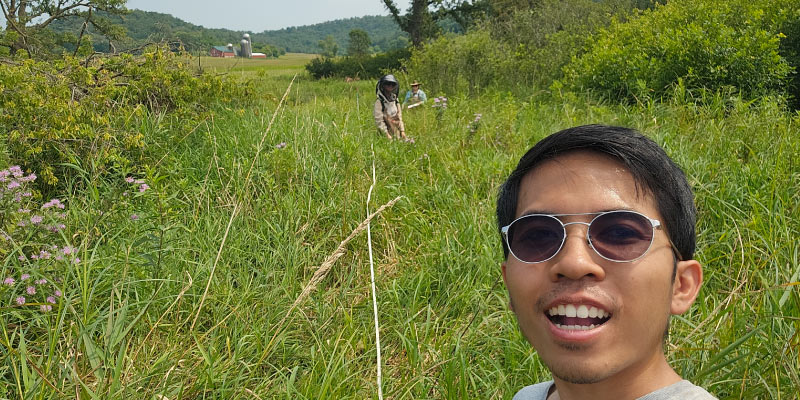
Water rippling. Birds chirping. Wind whispering. These are all sounds that can be heard while walking on the Lakeshore Path alongside Madison’s Lake Mendota — a favorite trail of many University of Wisconsin – Madison students, including Norman Arif Muhammad, a master’s student studying water resources management at the Nelson Institute for Environmental Studies. “When I explore natural areas, I’m always fascinated by the beauty of the environment around us. That’s why I’m so concerned about sustainability — so our future generations can also experience what I enjoy right now on campus,” he says.
Before coming to UW–Madison, Muhammad attended the Bandung Institute of Technology in Indonesia for his undergraduate degree in geodesy, learning how to create accurate representations of the Earth based on its geometric shape, orientation in space, and relationship with gravity. These attributes are known as the three fundamental pillars of geodesy. After graduating Muhammad worked as a research assistant for one of his professors to make gravity data measurement analysis software for government agencies. During this process, Muhammad focused on one of geodesy’s three fundamental pillars — Earth’s gravitational field — to help advance the creation of Indonesia’s accurate vertical reference maps representing gravity variations around the globe.
Muhammad continued his career working with Indonesia’s government in the water resource sector of the Ministry of Public Works and Housing. “It was a bit of a leap from a geodesy assistant to working in a water resource field,” Muhammad says, “but it gave me a synergistic effect — I had a unique perspective and skillset to answer questions in water-related problems.” With the Ministry, Muhammad was introduced to various water-related problems throughout Indonesia, such as flooding and drought, which piqued his interest in continuing his education to further tackle water-related issues.
Muhammad was given the opportunity to pursue higher education from the Indonesian Endowment Fund for Education, an entity within Indonesia’s Ministry of Finance, bringing him to UW–Madison today. Through this program, he receives a scholarship to continue his education, with the understanding that he will return to Indonesia to implement his newfound knowledge in his former job with the Ministry of Public Works and Housing. “It’s kind of my dream job because I get to travel often, which I love, and I also am able to contribute to society as an engineer in water resources, which I also love.”
When researching water management programs, Muhammad was drawn to the Nelson Institute’s water resources management (WRM) program. In particular, he appreciates the freedom of curriculum choices and the Nelson Institute’s interdisciplinary approach to education. He also was excited to learn that the program requires students to complete a practicum project, where they get hands-on experience solving real-world water resource issues.
Through his WRM coursework, Muhammad is learning how to approach water resource issues from a new perspective. “Due to my work in the infrastructure department in Indonesia, my solution to a water-related problem is to build a structure to address it — but I learned about bioengineering this past fall, and I’m fascinated by it,” he says.
“For example, bioengineering has been done in Lake Mendota to remove algae. Instead of installing a concrete or sediment trap, or using chemicals to get rid of the algae, they introduced large fish into the lake. The fish don’t directly eat the algae but reduce the pressure on organisms that do eat the algae by eating their predators,” Muhammad explains. “It’s really interesting and shows me a new perspective on solving water-related issues — not just by infrastructure, but through biological systems.”
Another takeaway Muhammad has from his WRM coursework is the significance of consistent water access. “People really underestimate the importance of water within our society — it’s very easy to access, which makes people take it for granted,” says Muhammad. Looking to the future, he hopes to champion the importance of clean water, perhaps by starting a water protection nonprofit. “Imagine if we didn’t have tap water for a few days. We would see chaos throughout society because it’s such a crucial resource,” he says. “We have to protect these important resources for the future of humanity.”